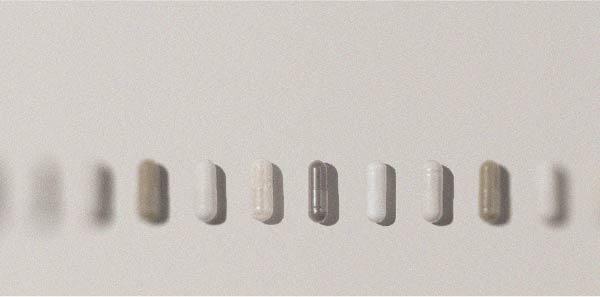What’s the best way to take vitamin B12?
How does the body absorb vitamin B12? Which supplement should you choose? Is there an ideal time of day to take it? SuperSmart provides the answers.

For maximum absorption, vitamin B12 should be taken in spaced out doses during the day as the body can only absorb small amounts of B12 at a time. It’s also best to avoid taking it too close to a vitamin B12-rich meal: one, for example, containing offal or red meat in general, shellfish, oily fish (tuna, herring mackerel, trout) or eggs...
With regard to dietary supplements, the three forms of vitamin B12 (cyanocobalamin, methylcobalamin et hydroxycobalamin) are all absorbed by the body in a similar way.
Why does vitamin B12 need to be taken in several doses?
The body absorbs vitamin B12 via two mechanisms (1):
- Passive diffusion, which takes place in the mouth and gut: this is a minor system and is insufficient to deliver an optimal intake of B12;
- Diffusion that depends on an « intrinsic factor ». This is a glycoprotein released in the stomach when gastric acidity results in the cleaving of cobalamin from the proteins to which it is attached. This system of diffusion is more effective but saturable: once the ‘quota’ of absorbable vitamin B12 is reached, it will take around four to six hours before it can again be absorbed.
That’s why it’s advisable to take supplements in several doses, and to avoid taking them at the same time as a vitamin B12-rich meal.
The role of vitamin B12 and potential consequences of deficiency
A deficit in vitamin B12 can pose serious health risks (2), such as:
- anemia (lack of red blood cells);
- nerve problems which can prove irreversible if the B12 deficiency is not quickly addressed: ataxia, a disorder that affects coordination, is one of the symptoms of cobalamin deficiency;
- incontinence;
- problems with vision.
Certain individuals need to be particularly careful when it comes to vitamin B12 intake:
- older people in whom absorption is less effective;
- those following a strict vegetarian or vegan diet, since cobalamin is primarily found in foods of animal origin.
Several studies have demonstrated the efficacy of vitamin B12 supplementation (up to 2mg a day) in preventing deficiency. We recommend Methylcobalamine 1 mg, a supplement that comes in the form of sugar-free, sub-lingual tablets, and helps to optimise function of the nervous system and reduce fatigue.
References
- O'Leary F, Samman S : Vitamin B12 in health and disease. Nutrients. 2010, Vol. 2(3), pp 299-316.
- Pierre Rufenacht, Anne Iten, Sara Mach-Pascual : Hypovitaminose B12 : challenge diagnostique et thérapeutique. Rev Med Suisse. 2008, Vol. 4, pp 2212-2217.
- Kuzminski, A. M., Del Giacco, E. J., Allen, R. H., Stabler, S. P., and Lindenbaum, J. Effective treatment of cobalamin deficiency with oral cobalamin. Blood 8-15-1998;92(4):1191-1198.
Keywords
5 Days
great products and prices
great products and prices
Marie
11 Days
Easy to navigate site
Easy to navigate site, had what I was searching for, good price. easy order-check out
James Tucker
17 Days
My skin is clearing up nicely!
Pretty good for my skin so far.
Christian
20 Days
The new packaging is excellent
The new packaging is excellent - finally! No more squashed boxes and torn envelopes.
GORAN
20 Days
Great Product
Great Product
Larry Garrett
25 Days
Quick shipping
Quick shipping; good price. No issues!
Mary McCarty
26 Days
Thr product is very good and is helping…
Thr product is very good and is helping me on my health. Then is always on time
LUGO Luz
29 Days
Buying was fine
Buying was fine. I had problems with the website not recognizing my login info, and had to call to get it fixed. Other than that, everything was good.
David S. Clark
29 Days
Your super maca and super ginseng are…phenomenal
Your super maca and super ginseng are phenomenal supplements that compliment each other when taking them together. Fantastic feeling of well-being and lots of mid day energy without the crash.
Keith Mason
32 Days
I have had amazing results with every…
I have had amazing results with every supplement I've purchased. I am extremely satisfied with this company
kirstin Torres
32 Days
Fine products
Fine products . They are on the leading edge of online supplements. The only issue -so far-is they sometime run out of subscription items.
Jason Argos
34 Days
The ordering process is very user…
The ordering process is very user friendly and the products always come in a timely manner.
CARTER Rhonda
36 Days
The price for Dr
The price for Dr. Pero's AC-11 is reasonable and in line with his views. (my former colleague). Keep it pure.
CAMPBELL Clayton
38 Days
Right on every time.
Right on every time.
Arthur Nicholas
41 Days
They are cheaper than everyone else and…
They are cheaper than everyone else and the shipping was fast. Great company.
Patricia Adams




